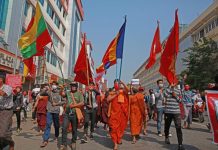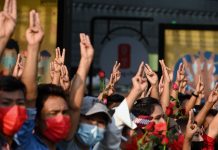
Canada will end its extradition treaty with Hong Kong, according to top officials. This comes after China implemented a national security law in Hong Kong.
Despite massive opposition from Hong Kong and Western nations, China sealed the national security legislation, shaping a major financial hub with a more authoritarian approach.
Prime Minister Justin Trudeau announced that Canada would continue to support Hong Kong, where 300,000 Canadians live.
He told reporters that Canada will not allow the export of military shipments to Hong Kong.
“We are also suspending the Canada-Hong Kong extradition treaty ... we are also looking at additional measures, including around immigration,” he said though he did not disclose details.
Foreign Minister Francois-Philippe Champagne slammed the “secretive” way the national security law had been signed. He pointed out that Canada had been forced to reevaluate existing deals.
“This is a significant step back in terms of freedom and liberty ... we had been hoping Beijing would listen to the international community and reverse course,” he said by phone.
German and British leaders also criticized the move of Beijing on Hong Kong.
”(There’s) a deep reflection in many capitals around the world as to how best to deal with China and its assertiveness,” Champagne said.
Meanwhile, China’s embassy in Ottawa was not available for any comment. Canada and China have tensions that started in late 2018 after Canadian police arrested Huawei Technologies Co’s chief financial officer on a US warrant.
Immigration lawyers said the incident sparked concerns from families seeking to relocate to Canada.
The lawyers added that Ottawa could favor Hong Kong residents who have family in Canada and invite more people to apply for a work program that will help them gain citizenship.
National security law
The passage of the national security law in Hong Kong took place a day before the anniversary marking Hong Kong’s handover from the UK to mainland China on July 1, 1997.
Hong Kong, a former British colony existing under the “one country, two systems” framework, enjoys liberties that the mainland does not have. These include limited election rights and a separate legal and economic system.
According to the Chinese government, the legislation aims to prevent secession, terrorism activities, subversion of state power, and foreign interference. The legislation was proposed during China’s annual parliamentary meeting in late May and sparked protests in Hong Kong over fears that the city’s liberties would wane.
However, critics believe the new legislation will erode the autonomy placed on the special administrative region for 50 years after the handover or until 2047. However, there is no clarity on the result when the policy ceases.
“A lot of groups will be thinking twice about their behavior for tomorrow,” Natasha Kassam told CNBC’s “Street Signs Asia." “The law will have a deterrent effect even though we don’t actually know the contents of it yet. And in that sense, I think Beijing will consider this to be a success story, at least in the short term.”
In a joint statement earlier, the US, UK, Australia, and Canada said they have “deep concern” regarding the national security law imposed on Hong Kong.
“Hong Kong has flourished as a bastion of freedom. The international community has a significant and long-standing stake in Hong Kong’s prosperity and stability,” it said.






